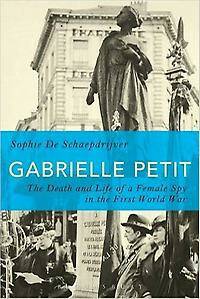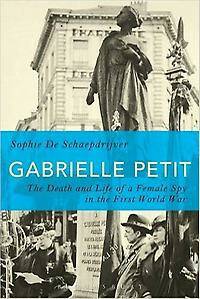
En raison d'une grêve chez bpost, votre commande pourrait être retardée. Vous avez besoin d’un livre rapidement ? Nos magasins vous accueillent à bras ouverts !
- Retrait gratuit dans votre magasin Club
- 7.000.000 titres dans notre catalogue
- Payer en toute sécurité
- Toujours un magasin près de chez vous
En raison de la grêve chez bpost, votre commande pourrait être retardée. Vous avez besoin d’un livre rapidement ? Nos magasins vous accueillent à bras ouverts !
- Retrait gratuit dans votre magasin Club
- 7.000.0000 titres dans notre catalogue
- Payer en toute sécurité
- Toujours un magasin près de chez vous
Gabrielle Petit
The Death and Life of a Female Spy in the First World War
Sophie De Schaepdrijver
Livre broché | Anglais
36,45 €
+ 72 points
Format
Description
In central Brussels stands a statue of a young woman. Built in 1923, it is the first monument to a working-class woman in European history. Her name was Gabrielle Petit. History has forgotten Petit, an ambitious and patriotic Belgian, executed by firing squad in 1916 for her role as an intelligence agent for the British Army. After the First World War she was celebrated as an example of stern endeavour, but a hundred years later her memory has faded.
In the first part of this historical biography Sophie De Schaepdrijver uses Petit's life to explore gender, class and heroism in the context of occupied Europe. Petit's experiences reveal the reality of civilian engagement under military occupation and the emergence of modern espionage. The second part of the book focuses on the legacy and cultural memory of Petit and the First World War. By analysing Petit's representation in ceremony, discourse and popular culture De Schaepdrijver expands our understanding of remembrance across the 20th century.Spécifications
Parties prenantes
- Auteur(s) :
- Editeur:
Contenu
- Nombre de pages :
- 272
- Langue:
- Anglais
Caractéristiques
- EAN:
- 9781472590862
- Date de parution :
- 26-03-15
- Format:
- Livre broché
- Format numérique:
- Trade paperback (VS)
- Dimensions :
- 155 mm x 231 mm
- Poids :
- 408 g

Les avis
Nous publions uniquement les avis qui respectent les conditions requises. Consultez nos conditions pour les avis.






